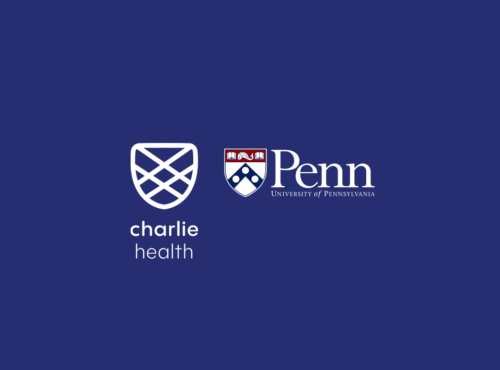
Table of Contents
New Research: Youth Journal Entries Provide Insight for Future IOP

Written By: Alex Bachert, MPH

Clinically Reviewed By: Dr. Kate Gliske
May 4, 2023
5 min.
A quality improvement analysis found youth focused on mental health symptoms, peer relations, and recovery.
Learn more about our Clinical Review Process
Table of Contents
Charlie Health’s Intensive Outpatient Program (IOP) has emerged as a flexible solution for effectively treating high acuity mental health symptoms. It’s particularly useful for teens and young adults because it allows them to receive care while maintaining relationships, attending school, and continuing activities that are essential for healthy development.
Although we know that this type of programming improves mental health outcomes, we still have limited insight into the perspectives of youth who are actually attending virtual IOP. To change that, a team of researchers conducted an analysis of voluntary journal entries to better understand Charlie Health clients’ experiences and how their reflections can inform decisions about future programming. The findings were recently published in a peer-reviewed article.
“This investigation found that adolescents and young adults tend to focus most in journal prompts on improvements in peer relationships and their ability to function in ‘normal life’ as signals that they’re getting better,” commented Dr. Kate Gliske, a lead researcher and Director of Research & Clinical Outcomes at Charlie Health.
“This stands in contrast to the way behavioral health has traditionally codified ‘improvement’ as a reduction in clinical symptoms such as depression or anxiety, and suggests healthcare systems should endeavor to incorporate measures of improvement meaningful to the populations they serve,” Gliske continued.
Understanding these viewpoints can help organizations better engage youth in the treatment process, motivate them to achieve desired outcomes, and support additional facets of recovery.
Below, we share further insights from Gliske and her team, as well as how to access virtual intensive outpatient programming for you or someone in your life.
The role of journaling in virtual IOP
Charlie Health monitors mental health progress in teens and young adults in two ways: measurement-based outcomes (PHQ-9 to monitor depression and GAD-7 to monitor anxiety) and narrative experiences (journal entries). For this investigation, the researchers focused solely on the journal entries.
Each participant received access to an electronic journal as part of the intake process prior to their first treatment session. Journaling was an opportunity for participants to document their progress, comment on what they did and didn’t like about the program, and share any other thoughts with the program staff—all completely voluntary.
As standard IOP protocol, Charlie Health sent weekly email and text message reminders asking the youth to document their treatment journey in an electronic journal. These journal entries were then used to help clinicians identify youth in crisis, as well as to better understand and respond to the needs and experiences of each program participant.
For this analysis, the researchers included journal entries from 66 teens and young adults, ranging in age from 11-20 years old. Each participant attended an average of 42 sessions over an average of 15 weeks. For additional context:
- 50% were female, 24% were male, and 26% were gender expansive (genderqueer/nonconforming, gender-fluid, gender-questioning, gender neutral or nonbinary)
- 28% identified as heterosexual or straight and 72% identified as a member of the LGBTQIA+ community (lesbian, gay, bisexual, transgender, queer or questioning, intersex, asexual/aromantic/agender, and any other sexual orientation or gender identity along the spectrum)
- The most common diagnoses were depression (73%) and anxiety (56%)
Join the Charlie Health Library
Get mental health updates, research, insights, and resources directly to your inbox.
You can unsubscribe anytime.
Youth share their experiences in their own words
Based on their observations, the researchers grouped the youths’ journal entries into several leading themes.
Peer relations
The team found that peer relationships, both in and outside of the IOP setting, were the most common theme observed in the journal entries.
Interestingly, the entries focused more on positive peer relations than peer conflict (54% versus 8%). According to the analysis, the journal entries reflected:
- A desire for more peer engagement
- Descriptions of positive peer engagement
- Instances of peer support
These findings highlight a term called “peer centrality,” which refers to the developmental process where youth rely heavily on their peers for social feedback—something that seems to occur for most teens regardless of mental health status. The researchers also commented that these peer relationships are important for building trust, intimacy, and self-reflection.
Recovery
Another leading journal theme was recovery. From a clinical outcome perspective, the standard definition of recovery focuses on symptom reduction. While some journal entries did link recovery with a reduction in symptoms, nearly one-third of entries focused instead on positive changes within or in response to their treatment.
Do you need more support with
your mental health?
Charlie Health can help.
For many youth, recovery was about maintaining hope and achieving their goals—despite their ongoing symptoms of mental illness.
More specifically, recovery was associated with:
- An increase in their ability to fulfill everyday role obligations
- Participating more fully in the therapeutic setting
- Embracing their emerging identities and living a more authentic life
An increase in autonomy—shown through increased self-acceptance and changes in self-presentation—was also considered to be an important part of recovery. .
Mental health symptoms
A third theme was mental health symptoms, though the researchers noted that was likely due to the program design. Clinicians offered journal prompts to help inspire youth participation, and some of those prompts requested ongoing feedback about symptoms. Some youth chose to describe their symptoms objectively, while others were more subjective and descriptive in their entries.
What does this mean for future youth IOP?
The analysis highlights a discrepancy in what defines improvement following high-acuity mental health care. While the traditional definition of improvement is clinical symptom reduction, it’s clear that youth are more focused on developing healthy peer relationships, autonomy, and self-expression. Youth are also looking for more coping mechanisms to help them fulfill responsibilities and social obligations while learning to navigate life with their complex mental health needs.
Understanding these insights is a way to empower participants to be more involved in their recovery. The researchers encourage the use of solicited journaling as a valuable method for encouraging youth to communicate needs that are outside of clinical expectations directly linked to their treatment.
“Adopting a multidimensional approach to measuring recovery could simultaneously support system- and client-level narratives for what it means to recover following treatment for a lifelong mental health condition," concluded Gliske.
Get help today
Founded in 2020, Charlie Health is the largest virtual mental health clinic for youth who are struggling with serious mental health disorders. Our personalized Intensive Outpatient Program (IOP) consists of support groups, individual therapy, and family therapy in order to best meet the needs of each person.
Whether you're exploring treatment options for the first time or searching for extra support, Charlie Health provides individualized and evidence-based mental healthcare in a safe, supportive space without disrupting your day-to-day routine.
Contact Charlie Health to learn more today.
References
https://www.apaservices.org/practice/reimbursement/health-registry/anxiety-disorder-response.pdf
https://www.apa.org/depression-guideline/patient-health-questionnaire.pdf
https://psycnet.apa.org/record/2022-91981-014
https://pubmed.ncbi.nlm.nih.gov/32043237/





